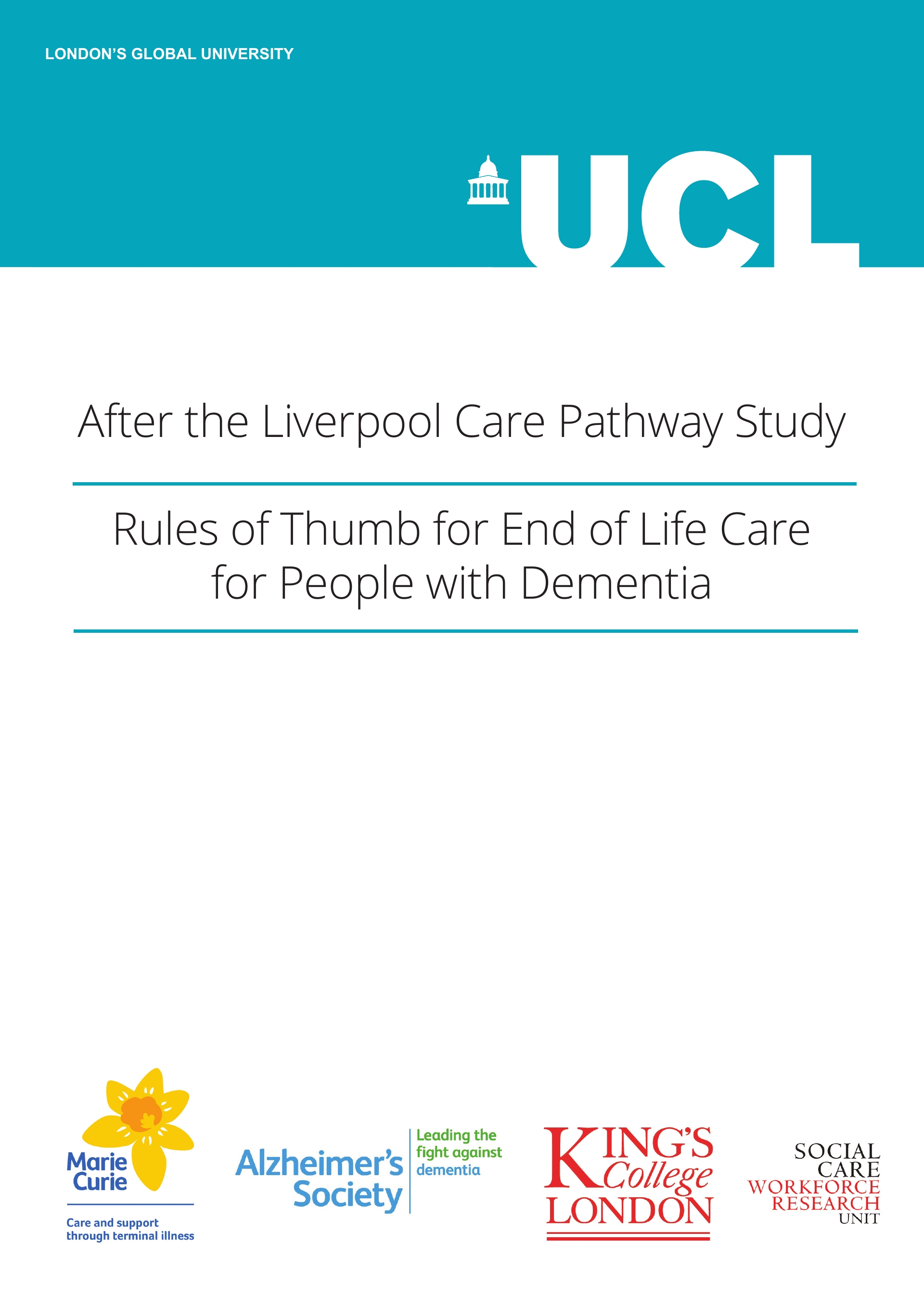Caroline Norrie reports on the presentation of findings yesterday from the major research programme known as EVIDEM, Evidence Based Interventions in Dementia.
Yesterday was a great day for those of us at the Social Care Workforce Research Unit, King’s College London who worked, together with colleagues from other universities, on the EVIDEM programme on changing practice in dementia care in the community. We joined an invited audience gathered at Friends House, Euston Road, London, to hear a summary of the EVIDEM programme research findings.
Presentations of the findings of this five year research programme were delivered to representatives from the Department of Health, the charity sector, health and social care professions, service user groups and research colleagues. This was the culmination of a huge amount of work and a fantastic opportunity to celebrate the project outputs.
EVIDEM was funded from a National Institute for Health Research (NIHR) grant of £2 million which ran from 2008-2012 with the aim of developing and testing interventions for people with dementia living in the community, including care homes.
Research teams were involved from King’s College London, UCL, LSE, St George’s & Kingston, University of London, University of Hertfordshire and Central and North West London NHS Foundation Trust.
The opening address was given by Professor Alistair Burns, the National Clinical Director for Dementia at NHS England, who outlined key policy goals in dementia such as: timely diagnosis and support for people with dementia; reduction in hospital admissions of people with dementia; improving services in care homes; reduction in the prescribing of anti-psychotic drugs; and care and support for carers. Professor Burns noted, “We are on the threshold of getting the data to change practice in dementia care.”
Chairs Peter Ashley and Dr. James Warner, then introduced the five speakers and Professor Steve Iliffe from UCL gave an overview of the EVIDEM Programme. This consisted of: EVIDEM ED (education), EVIDEM E (exercise) EVIDEM C (continence) and EVIDEM MCA (Mental Capacity Act), EVIDEM EoL (end of life).
Professor Steve Iliffe opened the presentations with a discussion of EVIDEM ED. The aim of this intervention study was to test a customized educational intervention developed for general practice, promoting earlier diagnosis with management guidelines. Five NHS providers and two overseas organisations have now rolled out this training.This randomized trial, however, showed that the intervention did not appear to change the practice of GPs, which led to discussion of what other levers could be used to encourage GPs to follow best practice guidelines for dementia care.
Dr. James Warner from Central and North West London NHS Foundation Trust introduced EVIDEM E. He discussed results from this randomized trial of exercise as therapy for behavioral and psychological symptoms of dementia (BPSD). Dr Warner described how this was a simple intervention – a person with BPSD and a their carer went on a walk five times a week for 12 weeks. This study found that regular simple exercise does not improve symptoms of BPSD, but it does decrease caregiver burden.
Professor Vari Drennan from Kingston and St. George’s, University of London, presented EVIDEM C. Work on dementia and incontinence is of huge significance because this is a key factor in why people with dementia move into care homes. This group of studies included 4 elements: i) scoping the evidence on prevalence, effective interventions, local clinical guidance on provision of NHS funded incontinent products; and a nested study of the THIN database reporting incidents rates for the first time, for urinary and faecal incontinence in community dwelling people with dementia; ii) a longitudinal study exploring the experiences and strategies of people with dementia, their family carers and health and social care professionals; iii) a feasibility study of the investigation of the effectiveness and acceptability of different designs of continence pads; and, iv) the design of a continence assessment tool tailored to the needs of people with dementia. Findings from Professor Drennan’s research team showed that the incidence of incontinence in community dwelling people with dementia is at least double that in a matched population. The use of indwelling urinary catheters, a management strategy discouraged by international and national clinical guidelines was in fact found to be double the rate in people with dementia compared to a matched population. The presence of faecal incontinence was found to significantly increase expenditure by almost two-thirds from both a health and social care perspective. “This study suggests that there are strategies and responses that primary care professionals and others can employ to encourage greater openness, thereby lessening the taboo of incontinence within the stigma of dementia.” added Prof Drennan.
Professor Jill Manthorpe, Director of the Social Care Workforce Research Unit, King’s College London outlined EVIDEM MCA. This project involved developing practice in and building evidence on the use of the Mental Capacity Act 2005 (MCA). Professor Manthorpe’s research showed that dementia care services and practitioners have traditionally not conceptualised their practice as being framed by legal rules. The MCA has proved a major challenge to this and dementia care. Key points from this presentation were that practitioners in dementia care need to be legally literate and aware of the new clauses making neglect and abuse criminal offences. There are messages also for thinking about how future changes to the legal framework of social care contained within the Care and Support Bill may be sustained. (Jill Manthorpe and Kritika Samsi’s presentation from the event.)
Professor Claire Goodman, from University of Hertfordshire presented on EVIDEM-EoL: Quality of Care at the End of Life. The project team has found the trajectories of end of life in people with dementia (PWD) are often unclear to care home staff, family and healthcare practitioners. They used Appreciative Inquiry (AI) as a way to enhance professional relationships around the care home. It fostered rapid and sustained engagement between care home staff and GPs, did not increase resource use, reduced use of emergency services and appeared to improve the management of unexpected events and unplanned hospital admissions.
Finally, the afternoon was brought to a close by Professor Steve Iliffe who gave a short presentation on how EVIDEM has worked with the government funded Dementia and Neurodegenerative Diseases Research Network (DeNDRoN) to help build systems to give people with dementia who are interested in research more choice and opportunity to get involved.
Overall, from the point of view of someone who worked as a researcher on one of the studies, this was a fantastic day, as it was highly satisfying to view the whole, complex programme of studies coming together and the wide range of evidence and research outputs produced.
Caroline Norrie is Research Fellow at the Social Care Workforce Research Unit, King’s College London. She is working on a NIHR School for Social Care Research funded project comparing the costs and benefits of different models of adult safeguarding.
 Dr Nathan Davies discusses Rules of Thumb for End of Life Care for People with Dementia. (954 words)
Dr Nathan Davies discusses Rules of Thumb for End of Life Care for People with Dementia. (954 words)
